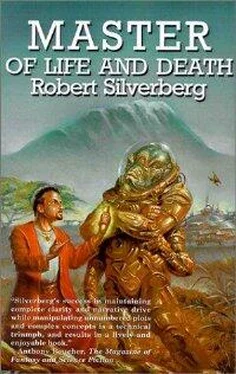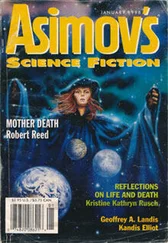Robert Silverberg - Master Of Life And Death
Здесь есть возможность читать онлайн «Robert Silverberg - Master Of Life And Death» весь текст электронной книги совершенно бесплатно (целиком полную версию без сокращений). В некоторых случаях можно слушать аудио, скачать через торрент в формате fb2 и присутствует краткое содержание. Год выпуска: 1957, Издательство: Ace Books, Жанр: Фантастика и фэнтези, на английском языке. Описание произведения, (предисловие) а так же отзывы посетителей доступны на портале библиотеки ЛибКат.
- Название:Master Of Life And Death
- Автор:
- Издательство:Ace Books
- Жанр:
- Год:1957
- ISBN:нет данных
- Рейтинг книги:5 / 5. Голосов: 1
-
Избранное:Добавить в избранное
- Отзывы:
-
Ваша оценка:
- 100
- 1
- 2
- 3
- 4
- 5
Master Of Life And Death: краткое содержание, описание и аннотация
Предлагаем к чтению аннотацию, описание, краткое содержание или предисловие (зависит от того, что написал сам автор книги «Master Of Life And Death»). Если вы не нашли необходимую информацию о книге — напишите в комментариях, мы постараемся отыскать её.
Master Of Life And Death — читать онлайн бесплатно полную книгу (весь текст) целиком
Ниже представлен текст книги, разбитый по страницам. Система сохранения места последней прочитанной страницы, позволяет с удобством читать онлайн бесплатно книгу «Master Of Life And Death», без необходимости каждый раз заново искать на чём Вы остановились. Поставьте закладку, и сможете в любой момент перейти на страницу, на которой закончили чтение.
Интервал:
Закладка:
“We have to be tough,” Walton told him firmly.
At 1517 he devoted a few minutes to a scientific paper that proposed terraforming Pluto by establishing synthetic hydrogen-fusion suns on the icy planet. Walton skimmed through the specifications, which involved passing a current of several million amperes through a tube containing a mixture of tritium and deuterium. The general idea, he gathered, was to create electromagnetic forces of near-solar intensity; a pulsed-reaction engine would supply a hundred megawatts of power continuously, at 10,000,000 degrees centigrade.
Has possibilities, Walton noted, and forwarded the plan on to Eglin. It sounded plausible enough, but Walton was personally skeptical of undertaking any more terra-forming experiments after the Venus fiasco. There were, after all, limits to the public relations miracles Lee Percy could create.
At 1535 the annunciator chimed again. “Call from Nairobi, Africa, Mr. Walton.”
“Okay.”
McLeod appeared on the screen.
“We’re here,” he said. “Arrived safely half a microsecond ago, and all’s well.”
“How about the alien?”
“We have him in a specially constructed cabin. Breathes hydrogen and ammonia, you know. He’s very anxious to see you. When can you come?”
Walton thought for a moment. “I guess there’s no way of transporting him here, is there?”
“I wouldn’t advise it. The Dirnans are very sensitive about traveling in such a low gravitational field. Makes their stomachs queasy, you know. Do you think you could come out here?”
“When’s the earliest?”
“Oh—half an hour?” McLeod suggested.
“I’m on my way,” said Walton.
The sprawling metropolis of Nairobi, capital of the Republic of Kenya, lay at the foot of the Kikuyu Hills, and magnificent Mount Kilimanjaro towered above it. Four million people inhabited Nairobi, finest of the many fine cities along Africa’s eastern coast. Africa’s Negro republics had built soundly and well after achieving their liberation from colonial status.
The city was calm as Walton’s special jet decelerated for landing at the vast Nairobi airport. He had left at 1547 New York time; the transatlantic trip had taken two hours and some minutes, and there was an eight-hour time zone differential between Kenya and New York. It was now 0313 in Nairobi; the early-morning rain was falling right on schedule as the jet taxied to a halt.
McLeod was there to meet him. “The ship’s in the hills, five miles out of town. There’s a ‘copter waiting for you here.”
Moments after leaving the jetliner, Walton was shepherded aboard the ‘copter. Rotors whirred; the ’copter rose perpendicularly until it hung just above the cloud-seeders at 13,000 feet, then fired its jets and streaked toward the hills.
It was not raining when they landed; according to McLeod, the night rain was scheduled for 0200 in this sector, and the seeders had already been here and moved on to bring rain to the city proper. A groundcar waited for them at the airstrip in the hills. McLeod drove, handling the turboelectric job with skill.
“There’s the ship,” he said proudly, pointing.
Walton felt a sudden throat lump.
The ship stood on its tail in the midst of a wide, flat swath of jet-blackened concrete. It was at least five hundred feet high, a towering pale needle shimmering brightly in the moonlight. Wideswept tailjets supported it like arching buttresses. Men moved busily about in the floodlighted area at its base.
McLeod drove up to the ship and around it. The flawless symmetry of the foreside was not duplicated behind; there, a spidery catwalk ran some eighty feet up the side of the ship to a gaping lock, and by its side a crude elevator shaft rose to the same hatch.
McLeod drew efficient salutes from the men as he left the car; Walton, only puzzled glares.
“We’d better take the elevator,” McLeod said. “The men are working on the catwalk.”
Silently they rode up into the ship. They stepped through the open airlock into a paneled lounge, then into narrow companionways. McLeod paused and pressed down a stud in an alcove along the way.
“I’m back,” he announced. “Tell Thogran Klayrn that I’ve brought Walton. Find out whether he’ll come out to talk to him.”
“I thought he had to breathe special atmosphere,” Walton said. “How can he come out?”
“They’ve got breathing masks. Usually they don’t like to use them.” McLeod listened at the earpiece for a moment, then nodded. To Walton he said, “The alien will see you in the lounge.”
Walton had barely time to fortify himself with a slug of filtered rum when a crewman appeared at the entrance to the lounge and declared ostentatiously, “His Excellency, Thogran Klayrn of Dirna.”
The alien entered.
Walton had seen the photographs, and so he was partially prepared. But only partially.
The photos had not given him any idea of size. The alien stood eight feet high, and gave an appearance of astonishing mass. It must have weighed four or five hundred pounds, but it stood on two thick legs barely three feet long. Somewhere near the middle of the column body, four sturdy arms jutted forth strangely. A neck-less head topped the ponderous creature—a head covered entirely with the transparent breathing mask. One of the hands held a mechanical device of some sort; the translating machine, Walton surmised.
The alien’s hide was bright-green, and leathery in texture. A faint pungent odor drifted through the room, as of an object long immersed in ammonia.
“I am Thogran Klayrn,” a booming voice said. “Diplomasiarch of Dirna. I have been sent to talk with Roy Walton. Are you Roy Walton?”
“I am.” Walton’s voice sounded cold and dry to his own ears. He knew he was too tense, pressing too hard. “I’m very glad to meet you, Thogran Klayrn.”
“Please sit. I do not. My body is not made that way.”
Walton sat. It made him feel uncomfortable to have to crane his neck upward at the alien, but that could not be helped. “Did you have a pleasant trip?” Walton asked, temporizing desperately.
A half-grunt came from Thogran Klayrn. “Indeed it was so. But I do not indulge in little talk. A problem we have, and it must be discussed.”
“Agreed.” Whatever a diplomasiarch might be on Dirna, it was not a typical diplomat. Walton was relieved that it would not be necessary to spend hours in formalities before they reached the main problem.
“A ship sent out by your people,” the alien said, “invaded our system some time ago. In command was your Colonel McLeod, whom I have come to know well. What was the purpose of this ship?”
“To explore the worlds of the universe and to discover a planet where we of Earth could settle. Our world is very overcrowded now.”
“So I have been given to know. You have chosen Labura—or, in your terms, Procyon VIII—as your colony. Is this so?”
“Yes,” Walton said. “It’s a perfect world for our purposes. But Colonel McLeod has informed me that you object to our settling there.”
“We do so object.” The Dirnan’s voice was cold. “You are a young and active race. We do not know what danger you may bring to us. To have you as our neighbors—”
“We could swear a treaty of eternal peace,” Walton said.
“Words. Mere words.”
“But don’t you see that we can’t even land on that planet of yours! It’s too big, too heavy for us. What possible harm could we do?”
“There are races,” said the Dirnan heavily, “which believe in violence as a sacred act. You have long-range missiles. How might we trust you?”
Walton squirmed; then sudden inspiration struck him. “There’s a planet in this system that’s as suitable for your people as Labura is for ours. I mean Jupiter. We could offer you colonial rights to Jupiter in exchange for the privilege of colonizing Labura!”
Читать дальшеИнтервал:
Закладка:
Похожие книги на «Master Of Life And Death»
Представляем Вашему вниманию похожие книги на «Master Of Life And Death» списком для выбора. Мы отобрали схожую по названию и смыслу литературу в надежде предоставить читателям больше вариантов отыскать новые, интересные, ещё непрочитанные произведения.
Обсуждение, отзывы о книге «Master Of Life And Death» и просто собственные мнения читателей. Оставьте ваши комментарии, напишите, что Вы думаете о произведении, его смысле или главных героях. Укажите что конкретно понравилось, а что нет, и почему Вы так считаете.












